Beth Tabler's Blog, page 149
December 17, 2022
Review: The Unseen World by Liz Moore
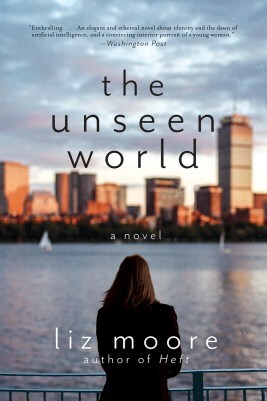 The Unseen World is Liz Moore’s beautifully written coming-of-age novel of Ada Sibelius. Ada is the daughter of David Sibelius, a pioneering researcher in artificial intelligence during the early 1980s. David is the director of a computer science laboratory at the fictional Boston Institute of Technology, or “The Bit” as it is affectionately known.
The Unseen World is Liz Moore’s beautifully written coming-of-age novel of Ada Sibelius. Ada is the daughter of David Sibelius, a pioneering researcher in artificial intelligence during the early 1980s. David is the director of a computer science laboratory at the fictional Boston Institute of Technology, or “The Bit” as it is affectionately known.
Ada is named after Ada Augusta, Countess of Lovelace, who is generally acknowledged as the first programmer—she programmed Charles Babbage’s mechanical computer and also published the first algorithm. Lady Lovelace was one of the most famous female mathematicians of the 19th century.
Ada Sibelius is homeschooled by her genius father, spending each day as a member of his research lab among the graduate students and other researchers. She is especially close with Diana Liston (known simply as “Liston”) who is David’s second-in-command at the lab.
David is a quirky but responsible father, that is, until his mind starts to fail with the onset of Alzheimer’s disease. Ada has no other family and must rely on Liston to navigate these most difficult years of her life.
Ada also has a friend in ELIXIR, David’s artificial intelligence program built for natural language processing. ELIXIR is meant to be a solution to the Turing test, i.e., the creation of a machine that converses so naturally that the user is unable to distinguish it from a real human being. ELIXIR learns by having conversations with people to help train it. Ada converses with ELIXIR every day, sharing her experiences with the program. ELIXIR becomes her main confidant during her tumultuous teenage years, almost like a brother to her.
The Unseen World mostly takes place during the 1980s, but it also flashes back to David’s past and forward in time to Ada as an adult. Much of the story is spent with Ada trying to uncover her father’s hidden past in an attempt to understand her own background and her own role in the world.
In The Unseen World, Liz Moore has captured the academic environment perfectly. I’m surprised by how many authors give unrealistic portraits of life in academia—an especially common problem in so-called “dark academia” books, many of which bear no resemblance to real academic life. But Liz Moore has portrayed academic life so perfectly in all its detail. She has also adeptly captured life growing up in the 1980s.
The Unseen World is a success in every respect. It is a touching coming-of-age story and family saga, coupled with a realistic account of the early days of artificial intelligence and an extrapolation to a sci-fi near future. I feel such a strong emotional connection with The Unseen World, which is a tribute to Liz Moore’s outstanding work as author.
Buy from Amazon
the unseen world•the unseen world•the unseen world•the unseen world•the unseen world•the unseen world•the unseen world•the unseen world•
The post Review: The Unseen World by Liz Moore appeared first on BEFOREWEGOBLOG.
December 16, 2022
Review – Miskatonic University: Elder Gods 101 by Matthew and Michael Davenport
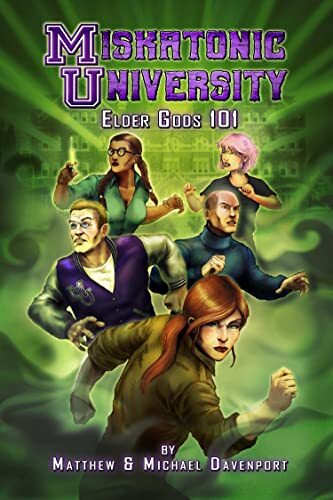 MISKATONIC UNIVERSITY: ELDER GODS 101 by Matthew and Michael Davenport is something I’ve seen before in books like Anna M. Pillsworth’s SUMMONED and Serra Elinsen’s AWOKEN but is always a pleasing concept to me: Young Adult Cthulhu Mythos fiction. Just like I love the Hunger Games for being horrifically traumatizing about child murder and PTSD, I love the thought about teenagers deaing with sanity bending horrors that will rip out your spine while sucking your soul into unfathomable dimensions.
MISKATONIC UNIVERSITY: ELDER GODS 101 by Matthew and Michael Davenport is something I’ve seen before in books like Anna M. Pillsworth’s SUMMONED and Serra Elinsen’s AWOKEN but is always a pleasing concept to me: Young Adult Cthulhu Mythos fiction. Just like I love the Hunger Games for being horrifically traumatizing about child murder and PTSD, I love the thought about teenagers deaing with sanity bending horrors that will rip out your spine while sucking your soul into unfathomable dimensions.
Technically, Miskatonic University: Elder Gods 101 isn’t Young Adult fiction. Its protagonists are all eighteen years old and freshmen at the aforementioned Lovecraft-created university. They’re all fresh faced and (mostly) innocent people more concerned with their studies as well as making friends versus drugs or partying, though. Which is the most unbelievable element of this book involving Miskatonic University as a lodestone keeping reality from drifting into other dimensions.
This takes place in the same universe as Matthew Davenport’s other HPL-inspired writings like the Andrew Doran series (who gets a name check) and The Trials of Obed Marsh. Which is to say it is a Pulpy good vs. evil sort of place rather than particularly cosmic in its horror. That’s not a bad thing as I have no problem with the Ghostbusters or Justice League punching the Big C in his squid-dragon face.
The premise is our heroes are secretly brought to the campus under false pretenses. All of them are descendants of HP Lovecraft characters ranging from Herbert West to the Whateley Family to a child of that delightfully fishy Innsmouth place. The students of Miskatonic University supposedly are in the dark about the supernatural but some of them are quite well-informed. At least enough for there to be a running prejudice from Innsmouth and its reigning sports team, the Chompers.
Some people may object to how much the book lowers the cosmic horror of the Mythos to comic book level and closer to PG urban fantasy than R-rated horror. The threat of life in Innsmouth is more being forced to partake in marriage when you’re gay as well as sticking to fundamentalist religion over the horror of inhuman transformation or sacrifice. Indeed, our fishy protagonist sees nothing weird about becoming a fish man and it comes with Aquaman-esque superpowers.
Strangely, if I were to say which author this book reminds me of most, it wouldn’t be HP Lovecraft but actually Drew Hayes. Specifically, his Super Powereds and Villains Code series. The protagonists are likable but not particularly deep archetypes that are constantly running into absurd situation after absurd situation. The episodic nature is to the stories credit, and we get to see with them deal with everything from time travel to the Wild West to the Cult of Cthulhu in the 21st century.
I think this is a pleasant afternoon’s read or perhaps multiple afternoons despite being only 250 pages. There’s a lot of information packed into its writing with those with at least a regular Call of Cthulhu player’s knowledge of the Mythos getting the most out of the in-jokes. Still, none of the references require being a long term fan to get the general context.
Check Out Some of Our Other Review
Review – Cthulhu Armageddon by CT Phipps
Review – Dawns Light by Hunter Blain
Buy from Amazon
Miskatonic University: Elder Gods 101•Miskatonic University: Elder Gods 101•Miskatonic University: Elder Gods 101•Miskatonic University: Elder Gods 101•Miskatonic University: Elder Gods 101•Miskatonic University: Elder Gods 101•Miskatonic University: Elder Gods 101•Miskatonic University: Elder Gods 101•
The post Review – Miskatonic University: Elder Gods 101 by Matthew and Michael Davenport appeared first on BEFOREWEGOBLOG.
An Interview with Matt Davenport

“The general tone is more of an urban fantasy meets coming of age. We’re intending this to be a series where we’ll see growth of the students into who they will become.”
1. Can you describe Miskatonic University: Elder Gods 101 to readers?
Miskatonic University: Elder Gods 101 is about 5 lost kids entering into adulthood with less answers than questions, as everyone at that age is. Unlike most, they only start to discover more and more questions as they find their lives entwined with Lovecraft’s horrors and the disturbing past of the school. It was very much inspired by stories like Harry Potter, Super-Powereds, and Divergent.
2. What separates it from other Lovecraft fiction out there?It takes itself slightly less seriously on the horror side of things. We could have gone full horror and existential dread, but Mike and felt like that would take away from the real horrors that some of these kids (and readers) would have been able to empathize with. There’s plenty of monsters and such, but the real horror in this story is teenagers learning that they don’t have all the answers. Every kid at that age is trying to find themselves, distance themselves from what they came from, or create something new entirely their own. These kids just have a lot farther to go than most.
 3. Is it more horror, sci-fi, or urban fantasy? What’s the general tone?
3. Is it more horror, sci-fi, or urban fantasy? What’s the general tone?The general tone is more of an urban fantasy meets coming of age. We’re intending this to be a series where we’ll see growth of the students into who they will become. Will they turn into fully developed horrors akin to the mythos that these ideas came from, or will they become fully functioning adults in a world that has mostly rejected them?
The real answer will be much messier than either of those answers, but it’ll be fun getting there and addressing their lives. We see a lot of that in Ralph in this first book. He not only struggles with where he comes from but he knows that the clock is ticking and he won’t be able to blend in for much longer. At what point does he make a choice on how to live his life, and does he even have a choice?
4. Why did you choose to write it this way?Most of the development of this book, prior to fingers on keyboard, was from my brother, Mike. He normally works with me on superhero novels, but he loved reading my Andrew Doran books and wanted to understand them better. In that, he decided to binge EVERYTHING Lovecraft. When he was done, he came to me with this idea.
As for the style, I normally write everything in first person, but we didn’t want to do that with this book. We wanted each of the students of the Scion Cycle to feel like the main protagonist.
5. Who are the protagonists of the book?Ralph, Carlos, Sheryl, and Meredith. Complete strangers at the beginning of the book, the injustices they deal with by just being themselves draws them together fairly early.
Ralph is directly from Innsmouth, and rumors abound of that place. Nobody puts much stock into those rumors, but it doesn’t stop them from being real ass-hats to people from there. The people of Innsmouth don’t do anything to dispel these rumors, using them much as they used anonymity in the 1920’s to deflect people from visiting. Even with that, though, the city couldn’t fight the tides of time, and had to start integrating their school sports with the rest of the state. That’s where Ralph found his love of football. That’s his only real love, as he doesn’t appreciated the forced indoctrination from his people or the demand that he marry a female spawn of Dagon when all he wants is to start his own life away from the sea and maybe with a certain boy instead…
Carlos is your average kid, mostly. He’s a local that gets weird visions that he doesn’t entirely understand. Out of each of the Scion Cycle, he’s the most gregarious and friendly.
Followed closely by Meredith, she’s mostly normal but with a curiosity that’s dangerous given her past. Her family has been in hiding, avoiding a group out there who have at least killed one of them.
Sheryl is a gamer. We all know her. She likes to fall into her video games after a stressful afternoon. Everyone keeps telling her that she’s a genius when it comes to math, but she hates math. She got into MU on a math scholarship, but she’s hoping she can use that as a jumping point to land in a gaming related field. If only those pesky nightmares would stop plaguing her. If they’re nightmares.
Stephanie is an odd duck. She’s cold and calculating on the outside, but she feels her emotions stronger than most. She focuses on her studies and learning everything that she can. For whatever reason, the students of Miskatonics, and ever some of the teachers, treat her with disgust and hate in their eyes. Especially that Halsey girl.
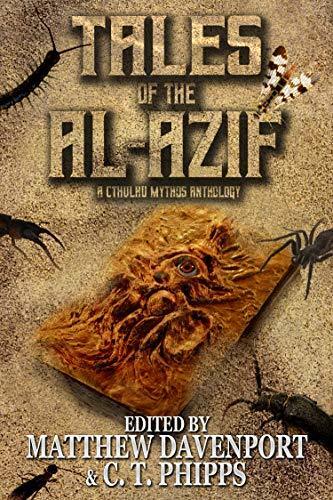 6. Who is your favorite among them?
6. Who is your favorite among them?Stephanie, definitely. She’s like writing for Wednesday Addams. You want to get to know her and as soon as you think you do, she does something completely unexpected, but not out of character. Ralph is a close second. He just wants a life, not even a normal one. He just wants one less odd than being part of an Innsmouth clan. Unfortunately, his problem is genetic and not as easy to escape.
7. What sort of adventures do they get into?At current, they get pulled into a lot of mythos related danger. Half of them are looking into their own pasts, and you quickly see that the past comes with a cost. Stephanie’s journey, specifically to the “old family home” was a lot of fun to write and we actually wrote two different versions of it. The second version might get worked into a later sequel. The other’s journeys are a lot about self-discovery, but even going to the library can come with hazards, as Meredith can attest.
There’s a subplot throughout the book that maybe bringing back an ancient witch can solve a lot of their problems, and they end up visiting alien worlds, the Dream Lands, and places that they could never have imagined visiting.
8. What draws you to the Cthulhu Mythos?I like weird. Not just any weird, but the kind of weird that leaves you with more questions than answers. That’s what draws me to a lot of Horror stories. The idea of a complex world hidden underneath everything we think we know uprooting our idea of comfort always attracts my attention.
Then there’s the “let me play in your sandbox” kind of feeling. All of Lovecraft’s crazy world and he never showed a good guy trying to tame it. Only bad guys who became so through trying to tame it. I like that as an ending for a character arc, but what about before all of that? What about when that dark wizard in the tomb was young and just finding the magic? When Lumley showed me that Titus Crow could exist, I saw opportunity to manipulate the mythos in a lot of ways. So, let me play with your sandbox and let’s see what happens…
9. What other Mythos authors would you recommend?David Hambling is one of my favorites. He’s a great friend to chat with and arguably my favorite pal over the pond. The same goes for my interviewer, himself, C.T. Phipps. Both Hambling and your stories lend a lot toward modernizing the mythos without subtracting from the horror.
And I have yet to meet a bad co-author in the Mythos. David Conyers, Peter Rawlik, David West, David Wilson, John DeLaughter, Andrea Pearson, Mark Howard Jones, and Byron Craft have been just wonderful to work with.
Conyer’s Harrison Peele universe makes me want to write more Doranverse stories, while Rawlik’s Weird Company keeps making me wish for an Avengers-style mythos movie.
10. Will we see more of this series?Definitely. We’ve already started notes on the second book, but we’re going to revise how they start. Book 2 will open up on the now host-less podcast that was mentioned in the story, with Meredith at the helm and trying to put out there a more humanizing view of Stephanie and her odd familial past. Plus, we left a lot of loose ends at the end of book 1. It will be fun pulling on those …
The post An Interview with Matt Davenport appeared first on BEFOREWEGOBLOG.
December 15, 2022
Review – Cthulhu Armageddon by CT Phipps
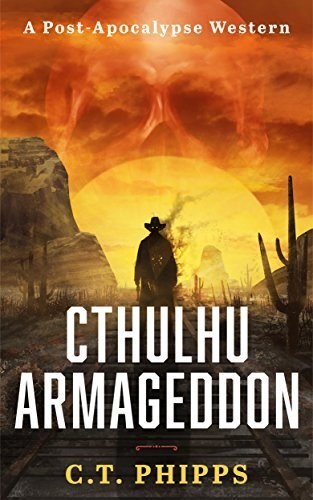 What is Cthulhu Armageddon About?
What is Cthulhu Armageddon About?
CTHULHU ARMAGEDDON is the story of a world 100 years past the rise of the Old Ones which has been reduced to a giant monster-filled desert and pockets of human survivors (along with Deep Ones, ghouls, and other “talking” monsters).
John Henry Booth is a ranger of one of the largest remaining city-states when he’s exiled for his group’s massacre and suspicion he’s “tainted.” Escaping with a doctor who killed her husband, John travels across the Earth’s blasted alien ruins to seek the life of the man who killed his friends.
It’s the one thing he has left.
ReviewLike all CT Phipps books, this is a very character driven story, even given the large and appalling setting of a world almost destroyed by the Old Ones. The relationships between Booth and his companions and enemies sets the tone for the whole book. Booth almost seems a man out of time, a warrior with honor in a time when that commodity is becoming increasingly scarce, even as his world slowly comes apart and his secret is revealed, even to himself.
The world building (destroying?) is excellent, giving you a feeling of living in this desolate and dying world, where you live on the knifes edge of survival. This has to be one of the best realized dystopian futures I’ve ever heard of in books. Plot and pacing are also top notch, with a great story line and fast paced action keeping the listener engaged. Unlike most of the author’s books, there is not a lot of snark in this one. An occasional funny line, sure. Outright snark, not as much, seeing as the giant tentacled horrors from the Outer Reaches have basically destroyed civilization.
Jeffrey Kafer does an outstanding job narrating the audio book, which is something I’ve come to expect from him. He brings each character to life, and keeps the narration flowing steadily, never letting his narration lag or become monotone. Just another excellent performance.
This book is a must read/listen to anyone into the Cthulhu mythos or dystopian worlds. It keeps the listener/reader engaged and wanting to see where the story will take them. In this case, it will be in directions you never expected. All told, another stellar effort from the author.
Rating: 9.5/10 Stars
Read More CT Phipps Stories
Review – Space Academy Dropouts by CT. Phipps and Michael Suttkus
Review- Psycho Killers In Love by C.T. Phipps
Buy from Amazon
Cthulhu armageddon•Cthulhu armageddon•Cthulhu armageddon•Cthulhu armageddon•Cthulhu armageddon•Cthulhu armageddon•Cthulhu armageddon•Cthulhu armageddon•
The post Review – Cthulhu Armageddon by CT Phipps appeared first on BEFOREWEGOBLOG.
Review – The Last Iota by Robert Kroese
“You can’t take attempted murder personally in this business, Fowler.”
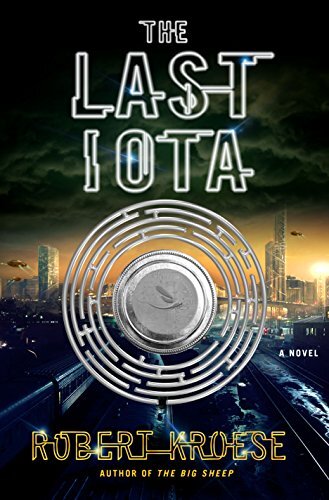 THE LAST IOTA by Robert Kroese is the sequel to THE BIG SHEEP and the further adventures of Erasmus Keane and his Watsonian sidekick, Blake Fowler. I really enjoyed The Big Sheep for the fact it managed to be an excellent parody of cyberpunk detective fiction while simultaneously being a really good example of the genre itself. The trick to pulling off the best send ups is that you have a good story at the heart of it and this is why SNOW CRASH remains a cyberpunk classic as well as a parody.
THE LAST IOTA by Robert Kroese is the sequel to THE BIG SHEEP and the further adventures of Erasmus Keane and his Watsonian sidekick, Blake Fowler. I really enjoyed The Big Sheep for the fact it managed to be an excellent parody of cyberpunk detective fiction while simultaneously being a really good example of the genre itself. The trick to pulling off the best send ups is that you have a good story at the heart of it and this is why SNOW CRASH remains a cyberpunk classic as well as a parody.
The setting’s premise is that California suffered great social upheaval and the creation of the “Disincorporated Zone” or DZ resulted in a large chunk of Los Angeles being a lawless territory run by gangs. Life has more or less gone on outside of the DZ with cloning, holographic technology, virtual reality, and so on all adopted by Hollywood to squeeze every last New Dollar from a jaded fame-hungry populace.
The book follows up the previous one with the two detectives asked by their old enemy, Selah Fiore, hiring them for a job. This is unexpected because the last time they met, Selah was trying to have them killed. Money is the great negotiator, though, and hunger is the best pickle, however. Facing bankruptcy and losing their office, Erasmus and Blake agree to take the case to find a physical representation of a cryptocurrency called Iotas. It was given away in a contest years ago and Selah is willing to pay a fortune for it.
Cryptocurrency is something I expect will eventually be viewed in much the same way as Pogs or headbands by the next decade, let alone NFTS, but forms the basis for our story. Like many promises by techbros who foresaw ways of subverting traditional economic forces and rewriting paradigms, it has proven to be a playground of scammers and broken promises.
Indeed, one of the humorous elements of Robert Kroese’s novel here is he highlights many vulnerabilities that cryptocurrency suffers and how these could be exploited by bad faith actors. Given the date the novel was written, it’s fascinating to realize this work was eerily prescient about the crashes we’re currently experiencing due to all of the revelations about pyramid schemes, money laundering, fraud, and embezzlement.
A bunch of cryptocurrency issues doesn’t sound like a very exciting cyberpunk detective story, but it really is. A bit like Chinatown, The Two Jakes, and Who Framed Roger Rabbit, the larger issues of white-collar crime are accompanied with much nastier crime on the streets. There’s a lot of fascinating sci-fi twists and turns that end in unexpected directions. There’s perhaps one twist too many in the identity of one character that is a bit too STAR WARS but, otherwise, I feel this was a really solid sequel.
In conclusion, I really like this novel but note that despite not being listed as part of a series, it definitely requires reading The Big Sheep to get the full effect. It is not a standalone. I hope that Robert Kroese will continue writing noir detective fiction with a cyberpunk twist as it’s my personal peanut butter and jam.
Buy from Amazon
THE LAST IOTA•THE LAST IOTA•THE LAST IOTA•THE LAST IOTA•THE LAST IOTA•THE LAST IOTA•THE LAST IOTA•THE LAST IOTA•
The post Review – The Last Iota by Robert Kroese appeared first on BEFOREWEGOBLOG.
December 14, 2022
Review – Dawn’s Light by Hunter Blain
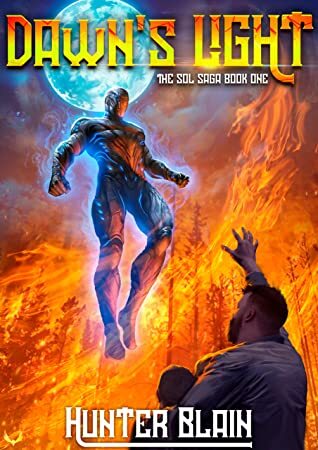 DAWN’S LIGHT by Hunter Blain is the first book in what I hope will be a long-running superhero series. The Sol Saga is a change from the author, who is primarily known for his Preternatural Chronicles books. Being as I am both a urban fantasy as well as superhero author, I was interesting in reading what another author making the leap between genres would be able to do with the change in expectations. Much to my surprise, the result can basically be summarized as, “What if Watchmen was really-really funny?”
DAWN’S LIGHT by Hunter Blain is the first book in what I hope will be a long-running superhero series. The Sol Saga is a change from the author, who is primarily known for his Preternatural Chronicles books. Being as I am both a urban fantasy as well as superhero author, I was interesting in reading what another author making the leap between genres would be able to do with the change in expectations. Much to my surprise, the result can basically be summarized as, “What if Watchmen was really-really funny?”
The zig-zags of tone will not be for everyone but I have to say I found to be immensely entertaining. Specifically, this can be some of the darkest superhero literature I’ve read with the protagonist, Sol, giving a family terminal radiation sickness while trying to save them from burning to death in a fire. Later, his attempts to take refuge with a family result in the horrific death of everyone involved, including a scene where someone begs him to save their dying mother only for him to be able to do anything about it.
Then there’s Harry, who is quite possibly the worst soldier of all time and who every single action probably contributes to the “Things Private Skippy is no longer allowed to do” list. In a book where large sections of America are devastated and many innocents are slaughtered in the “a teddy bear is floating in the pool ALA Breadking Bad” way, he’s the kind of guy who stops to make a loud Ghostbusters joke. I personally love this as it’s utterly insane and contributes to the book’s uniquess.
The premise is Sol is a strange visitor from another dimension inhabited by humans. Exiled by his people for the crime of accidentally killing someone, he has gained immense powers via the transfer to this reality but has a spotty memory. Tenebris has a bunch of solar based powers and is someone who terrifies the government but he is willing to do his part to try to make the world a better place. In fact, it’s his job to save us from ourselves.
In what I think is one of the humor bits that doesn’t contrast with the darker themes, I really enjoyed the fact that Sol is completely oblivious to how horrifying and dystopian his society is. Its a totalitarian eugenics society that is implied to have destroyed all rival culture and outlawed religion but Sol gets all butt hurt when anyone reacts to his descriptions with anything other than complete happiness.
There’s a strong but subtle social satire element to the book as well with the premise being, essentially fascism vs, anarchy (ala the original V for Vendetta). Sol comes from a society of absolute authority and control but he’s up against a man who argues, not unconvincingly, that the current governments of the world are less of an actual social contract and more of a pyramid scheme. I also appreciated his plan to blow up all social media in the world, which seems like it would be counter-intuitive but actually fits with his real goals.
I really like the set up for the world and appreciate the fact that it has a twist I genuinely did not see coming but makes sense of all the inconsistencies I’d spotted throughout the book until the end. Hunter Blain is an always entertaining author and while I have some mild issues with the book, I really enjoyed it from beginning to end.
Buy from Amazon
DAWN’S LIGHT•DAWN’S LIGHT•DAWN’S LIGHT•DAWN’S LIGHT•DAWN’S LIGHT•DAWN’S LIGHT•DAWN’S LIGHT•DAWN’S LIGHT•
The post Review – Dawn’s Light by Hunter Blain appeared first on BEFOREWEGOBLOG.
December 13, 2022
Review – The Justice Of Kings by Richard Swan
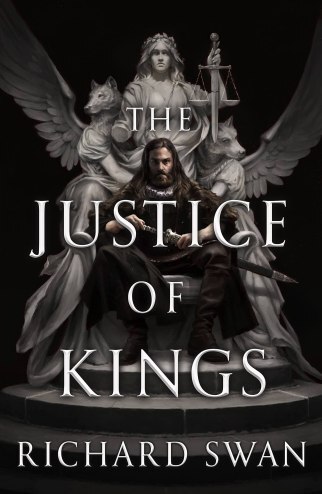 There are times when we can have book burnt out, or a reading slump and it seems like a mountain hike to reach that height of reading enjoyment again. I took a break from reviewing and my TBR and did some mood reading this November. I wasn’t planning on reviewing anything, just enjoying the process of sitting with a cup of coffee and reading.
There are times when we can have book burnt out, or a reading slump and it seems like a mountain hike to reach that height of reading enjoyment again. I took a break from reviewing and my TBR and did some mood reading this November. I wasn’t planning on reviewing anything, just enjoying the process of sitting with a cup of coffee and reading.
That was until I read The Justice of Kings. This book blew me away to a point that I could NOT move on without reviewing it. Thank you, Richard, for bringing me out of my forced hiatus.
The story follows Sir Konrad Vonvalt and his clerk and protege, Helena Sedanka, as they travel around the Empire of the Wolf upholding the law, punishing those that have broken it. Sir Konrad is a Justice from the Order of Justices who lives and breathes a strict code and a stern belief that no-one is above the law. Investigating the murder of a provincial aristocrat, Vonvalt and Helena stumble into a conspiracy that spans wider than either of them could ever believe.
I have never read a fantasy story like this before. That was my initial reaction when I was a few chapters into the book. It felt fresh, innovative and grabbed my attention immediately. Richard Swan studied law at the University of Manchester, and his knowledge of law really shines throughout the story. I am a fan of C. J. Sampson’s Matthew Shardlake series, which takes place around the reign of Henry VIII and follows Shardlake, a lawyer, and his investigation into murders which leads to uncovering political conspiracies. The Justice of Kings very much reminded me of that. Throw into the mix a bit of The Witcher and Dune, and you get this awesome murder investigation with a fantastic magic system. More on that in a minute.
Swan creates a vividly grim, medieval world of violence, religious fanaticism and shadowy powers. I was captivated by the political intrigue, the men of power desperately holding on to that power and willing to lie, deceive and kill for it. One of the main antagonists Patria Claver, a character I loved to hate, oh and I hated him, is a fanatical priest who is not who he appears to be. Richard creates a deliciously despicable bad guy here and his story is brilliantly weaved into the narrative.
Vonvalt is a character with formidable presence, and he will stick in the memory for a good while. I am writing this review two weeks after I finished, and his scenes still linger in my memory. Vonvalt’s belief in the law is his defining characteristic, his intelligence and physicality are intimidating along with his hard edge and brutality when he draws his blade. He has a past that is explored to some degree and I am sure we will learn more in future books. Being a Justice, Vonvalt has access to special magical abilities, the power of the Voice being essential in extracting the truth from people. It reminded me of the use of the voice in Dune by the Bene Gesseritt, but what I loved about Swan’s creation of the Voice is where its source is and how you use it, but I won’t go into more detail, because the less you know, the greater the impact. It becomes a fascinating and integral part of the story as well as the character of Vonvalt.
But what really brings this book to life is the character of Helena Sedanka. We read the book through her words, as she recounts the events to us as an old woman. The narrative framing gives this book a fantastic and unique feel. There is a vibrancy and intellect to Helena’s words, how she describes scenes, her emotional investment, her fears and dreams. Helena is a woman of two worlds, where she came from and where she is going, conflicting and disparate and it makes for such an immersive read. She has a sharp wit and street smart that is layered in the text and comes into play throughout her journey. I found learning about Vonvalt through Helena’s eyes and voice utterly compelling. Swan is a master of immersion and that is crucial to me when reading fantasy.
Pacing is always a big thing for me in fantasy and Swan navigates us through the story in an expert manner. The story moves along beautifully, there is no sagging, no part of the story where I thought it could be snipped or cut. Even just scenes of characters investigating, working things out, have an urgency and stakes to them.
I highly recommend The Justice of Kings for anyone wanting to take a different direction in their fantasy reading. The first-person perspective of Helena brings an energy that is addictive and makes you want to read chapter after chapter. Swan has created a vivid world, utterly believable and characters who are authentic, full of depth, flawed and in pain. Framing the story around law, the implications of upholding that law, and the lengths to which you would go and how it defines you as a person, is surprisingly captivating. This is a 5/5 for me. A flawless debut.
Buy from Amazon
the justice of kings•the justice of kings•the justice of kings•the justice of kings•the justice of kings•the justice of kings•the justice of kings•the justice of kings•
The post Review – The Justice Of Kings by Richard Swan appeared first on BEFOREWEGOBLOG.
December 10, 2022
Review: The Hollow Gods by A.J. Vrana (The Chaos Cycle Duology #1)
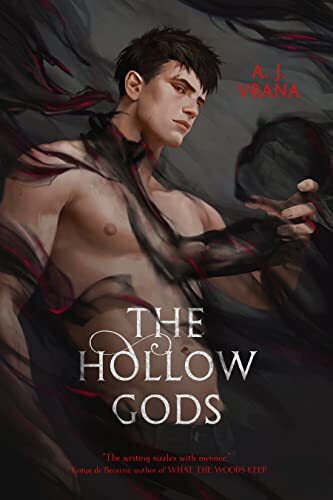 What is the Hollow Gods About?
What is the Hollow Gods About?Black Hollow is a town with a dark secret.
For centuries, residents have foretold the return of the Dreamwalker—an ominous figure from local folklore said to lure young women into the woods and possess them. Yet the boundary between fact and fable is blurred by a troubling statistic: occasionally, women do go missing. And after they return, they almost always end up dead.
When Kai wakes up next to the lifeless body of a recently missing girl, his memory blank, he struggles to clear his already threadbare conscience.
Miya, a floundering university student, experiences signs that she may be the Dreamwalker’s next victim. Can she trust Kai as their paths collide, or does he herald her demise?
And after losing a young patient, crestfallen oncologist, Mason, embarks on a quest to debunk the town’s superstitions, only to find his sanity tested.
A maelstrom of ancient grudges, forgotten traumas, and deadly secrets loom in the foggy forests of Black Hollow. Can three unlikely heroes put aside their fears and unite to confront a centuries-old evil? Will they uncover the truth behind the fable, or will the cycle repeat?
Hello again dear reader or listener!
Today I bring you a review without a rating. Yep. That’s right. No rating. I have quite frankly no idea how to even begin rating this book. No stars or numbers can explain or equate my feelings about this novel even though I have wracked my brain for hours trying to decide. So, in the immortal words of Captain Jack Sparrow:
Gentlemen… I wash my hands of this weirdness
I will just say my thing and leave as I came.
The Hollow Gods is an adult fantasy horror novel with an incredibly intriguing premise dealing with a small town and mysteries plaguing it. Is it actually supernaturally cursed by an evil spirit kidnapping women with the aid of vicious wolves? Or do its inhabitants suffer from mass hysteria on the regular and turn on each other at random? That’s what Mason, one of the three main protagonists, tries to figure out as he finds himself in this otherwise quaint and normal town when trying to take respite from the weight of hospital work. Meanwhile Miya a struggling uni student who lives in Black Hollow, realizes she might be the next woman led into the woods even as she doesn’t want to give in to her town’s superstitions. Finally, we have Kai, a foul-mouthed and spectacularly cranky wolf shifter who knows spirits are very true and very big pains in his (occasionally furry) ass, even if he doesn’t yet know why they haunt him in particular, tying him to the dying and disappearing women.
As I am gearing up to get into another fully horror novel, I thought this would be a great way to ease myself back into a genre I used to love but hadn’t really enjoyed in a while and, for the most part, Vrana succeeded in creating an eerie setting, with very atmospheric writing and an overall intriguing plot that unfolded slowly and strung my curiosity along at a good, if perhaps a little sedate, pace. Initially that is, and only when in regard to the main mystery plot, as for example there is a romance subplot that while suitably cute and wholesome, felt a smidge rushed and insta-lovey without much preamble. This is a bit of a nit pick to be fair, since the end reveal sort of explains the bases for it, and the present love subplot (as opposed to one in the past) doesn’t have that much bearing in the overall plot in any case. But it still nagged at me a tad.
In any case, the other horror and suspense elements where well done I thought, even if not that scary to me, but then again, night terrors and sleep paralysis demons are insanely cool/fascinating to me personally so I might not be the best judge for what is and isn’t scary. So, let’s say that there are many instances of suitably eerie and unsettling happenings which not only add to the ambiance but also to the unreliability of the protagonists’ mental states. Furthermore, Miya is an insomniac with depression and anxiety, Kai is possessed by a demonic spirit that talks to him, affects his actions, and mocks him on the regular, and Mason is grieving the loss of his first cancer patient because of his mistakes so he is near obsessively looking to distract himself with the town’s fables and superstitions. So really, they are all very much not having a good time. And through all this, Vrana weaves the lives of each of his protagonists together in an interesting manner that starts by showing how they each begin tangential to each other and then slowly knit together significantly. I also liked how, often, the author would pick up the scene of his next pov from a few moments before the end of the previous one thus making the transition between them more seamless.
Moreover, one of the things I liked the most in this book was the fact that Vrana never “forgets” that Kai is first and foremost a wolf that can turn into a human. The thing is, with a lot of shifter stories, these characters behave entirely human aside from like one or two of the cool traits that are kept for wow factor, dramatic moments, or comic relief, such as occasionally mentioning their heightened senses or throwing in some questionable behavior that is excused or explained with things like ‘oh they’re overprotective cause pack mentality’ and what not. This can often be pretty superficial and a bit of a cliché round in other words. Whereas in Vrana’s story there is legit wolf behavior all the time, in their mannerisms and little gestures, or in way they move or react to certain things, how their survival instincts work, without ever falling into a lot of the common misconceptions that exist about wolves. All of which really showing that the author either spent time with actual wolves or researching them a lot, while also not feeling the need to polish Kai so much as to make him a more likeable or affable protagonist.
In fact, in addition to all the wolfy traits, his directness, standoffishness, matter of fact attitude, and overall extreme crankiness and free for all no qualms swearing made him my favorite character. He felt the most genuine and well developed of the three protagonists for it. Mason appears pretty grounded as the more rational and external to the weirdness character of the three, with his plotline being the easiest to follow too. As for Miya, you feel for her and her struggle to remain tethered, but at the same time she somehow also felt a tad one dimensional most of the time, which is a shame as she could’ve been so much more and for all intents and purposes is supposed to be the most central of the three. Also there’s a sassy raven named Kafka whose whole deal seems to be existing purely to create questions and doubts.
Now then, here is where things go off the rails in my beleaguered brain, so apologies in advance. Put bluntly, a big chunk of this novel confused the hell out of me. I had so many questions from the get-go and that is all well and good, that is the whole point after all, but as I got to the end, a lot of these (and an argument can be made as to them being way too many) remained unanswered. While I am aware that this is a duology and I definitely will be reading the sequel, The Echoed Realm, hoping for more clarity and to conclude the story, I cannot help but feel like there were a lot of things missing or a lot of doors opened without then being closed reasonably, making for one drafty house, so to speak. In other words, while its foundation is definitely solid and its walls and roof are all where they should, there are way too many gaps in between fissures and planks. Look at that complete metaphor right there, pat on the shoulder for Eleni.
In truth, past a certain point, the only clear and straightforward bits of the plot were those which dealt with the origins of the town’s fable etc., with the right touch of the nostalgic and definitely very tragic, fitting within its genre. But that’s about were the clarity ends. Otherwise, there is action, fighting, dream-walking, lots of talking in riddles or with pretty melodramatic one-liners, and finally several fade to black moments whose later explanations only gave me even more questions. Oh and character’s whose existence and backgrounds are simply not explained at all. They just sort of appear, do their mysterious and cool thing, confuse the reader and protags a ton more and then leave.
Yeah. I am lost.
And yet I cannot help but still be curious to continue and see if maybe I’ll understand things better with the sequel, even though there is no actual indication that the next book will bring any answers. In a bit of an absurdity, in this story full of gaps and openings, there is no evidence that any of the loose threads will be tied. The book just ends sort of abruptly, even if somewhat tenderly, leaving the reeling reader to try and pick up the pieces of all the things that happened in a rush in the last 30% of the story, while also not being entirely certain that some things did happen? For example, I’m pretty sure the villain is thwarted buuuut I have no freaking clue how Miya was responsible for it other than some vague epiphany about herself?
I just… help? Can somebody read this and then help me understand?
So there you have it dear reader or listener, I read a book with several things that I enjoyed in it and lots of promise but that ultimately left me severely confused and befuddled to say the least. And I nonetheless want more?! Do with that what you will.
Until next time,
Eleni A. E.
P.S: here’s a screenshot from the book that made me laugh for a solid two minutes because reasons.
 Check Out the Original Review Here
Check Out the Original Review Here
Review – The Thirteenth Hour by Trudie Skies
Review – The Monsters We Feed by Thomas Howard Riley
Buy from Amazon
THE HOLLOW GODS•THE HOLLOW GODS•THE HOLLOW GODS•THE HOLLOW GODS•THE HOLLOW GODS•THE HOLLOW GODS•THE HOLLOW GODS•THE HOLLOW GODS•
The post Review: The Hollow Gods by A.J. Vrana (The Chaos Cycle Duology #1) appeared first on BEFOREWEGOBLOG.
December 8, 2022
Review – The Thirteenth Hour by Trudie Skies
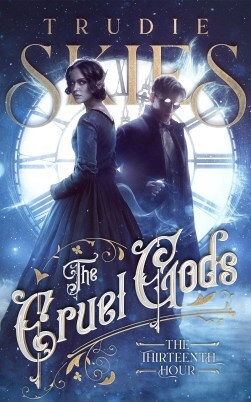 What is The Thirteenth Hour About?
What is The Thirteenth Hour About?Cruel gods rule the steam-powered city of Chime, demanding worship and tribute from their mortal subjects. Kayl lost her faith in them long ago, and now seeks to protect vulnerable and downtrodden mortals from their gods’ whims. But when Kayl discovers powers that she didn’t know she had—and destroys a mortal’s soul by accident—she becomes Chime’s most wanted.
Quen’s job was to pursue sinners, until the visions started. Haunted by foreboding images of his beloved city’s destruction, Quen hunts soul-sucking creatures made of aether who prey on its citizens—and Kayl is his number one target.
To ensure Chime’s future, Kayl and Quen must discover the truth of Kayl’s divine abilities before the gods take matters into their own hands.
For a city that bows to cruel gods, it’ll take godless heathens to save it.
The Thirteenth Hour is the first book in The Cruel Gods series—a gaslamp fantasy featuring magical portals, gothic cosmic deities, quaint Britishisms, and steampunk vibes. This is an adult book containing strong language and mature themes that some readers may find disturbing. For a full list of content warnings, visit Trudie Skies’s website.
My ThoughtsCongratulations to Skies for becoming an SPFBO Finalist (from the Before We Go Blog team to boot)! As was evident from the average rating from Before We Go Blog, The Thirteenth Hour has much to offer any reader and is deserving of its finalist spot.
I agree with many of my team members on their comments about the fascinating world building and unique plot of this story. There are 12 different domains in this tale, each ruled by a different cruel god that uses their subjects to achieve their every whim. However, the gods’ power stops when it comes to the central domain of Chime which is ruled by the mortals themselves. We follow two main characters: one who is fighting against the current regime and one who is working for it.
The premise of this world caught my attention from the beginning and the gods were just as fascinating to read about as I expected. Deities walking amongst us (especially 12 of them)? Sign me up! I also enjoyed the found family aspect of the story as it added a feeling of comfort in a dark and dangerous world.
However, I felt that the world was so vast that it was a bit too much to take on in one novel and left us with some significant gaps in the building process. I was interested to find out more, but I found myself focusing on what wasn’t there rather than what was.
Additionally, I found that I struggled to connect to the characters in the story; which as a character-based reader does affect my personal enjoyment. The motivations behind their actions weren’t always consistent for me and this also contributed to feeling disconnected from the climactic events in the finale.
In summary, I completely see why The Thirteenth Hour has captured the hearts of so many despite the elements that didn’t work for me personally. I wish Skies the best of luck in the SPFBO8 finals!
3.5 stars.
Check Out Our Other ReviewsReview – The Thirteenth Hour by Trudie Skies
#SPFB08 SEMI-FINALIST REVIEW – THE THIRTEENTH HOUR by Trudie Skies
Buy from Amazon
the thirteenth hour•the thirteenth hour•the thirteenth hour•the thirteenth hour•the thirteenth hour•the thirteenth hour•the thirteenth hour•the thirteenth hour•
The post Review – The Thirteenth Hour by Trudie Skies appeared first on BEFOREWEGOBLOG.
December 7, 2022
Review – The Monsters We Feed by Thomas Howard Riley
There are always things we can’t stop doing no matter how hard we try.
We all lie. We all have secrets.
We are all feeding monsters.
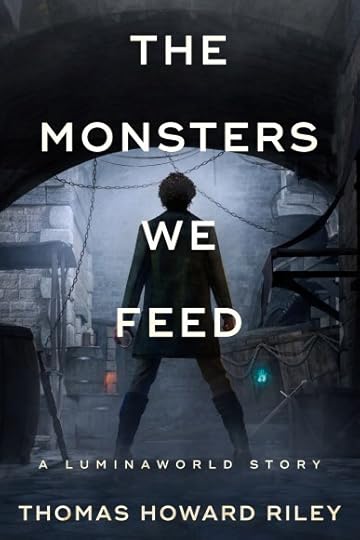 The Monsters We Feed by Thomas Howard Riley has a heartbeat. It beats with anger, desperation, and something in between love and hate. The pages pulse with life in all its gritty messiness. The book is visceral and brutal, and utterly compelling.
The Monsters We Feed by Thomas Howard Riley has a heartbeat. It beats with anger, desperation, and something in between love and hate. The pages pulse with life in all its gritty messiness. The book is visceral and brutal, and utterly compelling.
Taking place in the same world as We Break Immortals (although you can absolutely read The Monsters We Feed as a standalone), the book starts with a bang. Well, actually it starts with the mention of a dead body, setting the tone from the first eleven words. This is not a happily ever after sort of fantasy. Rather, it is an R-rated look into the complexities of human nature. It’s full of sex (lots and lots of it) and violence (lots and lots of it), as well as characters that bypass “morally gray” and waltz right into “evil” territory.
Jathan, our main character, is an incredibly messed up person. He’s a bundle of anger wrapped in hard edges and lies told to himself and to others. His parents were killed when he was a child, leaving him with a loathing for magick. Years later, he lives with his sister Lyra in his family home (which she is desperate to leave). She is his rock, but he is her anchor, weighing her down and holding her back. Jathan happily uses her as an excuse for his less-than-savory actions, which include selling out any users of magick he comes across in exchange for money. His sweet sister deserves better, to be honest. So does her friend who inexplicably finds him attractive.
Jathan makes yet another in a string of bad decisions when he loots a dead body, finding a Jecker Monocle. This device allows him to see “traces” of magick, making it a heck of a lot easier to track down and sell out magick users. Of course, this brings a new brand of trouble as Jathan soon finds himself suspecting his sister of having a liaison with a hated magick user.
The magick in both The Monsters We Feed and We Break Immortals is incredible. It’s extremely complex but Riley describes it in a way that explains it without adding to confusion or making it boring. So much rides on Jathan’s feelings about magick and the way the Jecker Monocle is used that it was imperative to have a fully developed magic system. A vague idea or underdeveloped magic would not have worked. Luckily, Riley doesn’t do anything by halves. The magic- like the rest of the book- is fully formed, a living, breathing thing.
The fact that The Monsters We Feed is told solely from the point of view of such an unlikable character makes it even more interesting. Where Jathan lacks in charisma, he makes up for in layers upon layers of fear and grief masquerading as anger and sometimes even as love. His self-destruction is engrossing, although sometimes painful to read. I really felt sad for him at times.
Once you start reading a book like this, there’s no stopping or putting it down until you’ve turned the last page. The writing is excellent, the world is immersive, and the characters fascinating. I’m not big on sex scenes in books (I know it’s odd that I am fine with fantasy violence, but book sex makes me uncomfortable; I never claimed to be normal), but everything else was awesome.
If you like fantasy that blurs the line between right and wrong, that has flawed characters with questionable morality, and drags secrets usually hidden away into glaring light, The Monsters We Feed is for you.
Buy from Amazon
the monsters we feed•the monsters we feed•the monsters we feed•the monsters we feed•the monsters we feed•the monsters we feed•the monsters we feed•the monsters we feed•
The post Review – The Monsters We Feed by Thomas Howard Riley appeared first on BEFOREWEGOBLOG.



